Session 3 动词的形式
Session详解
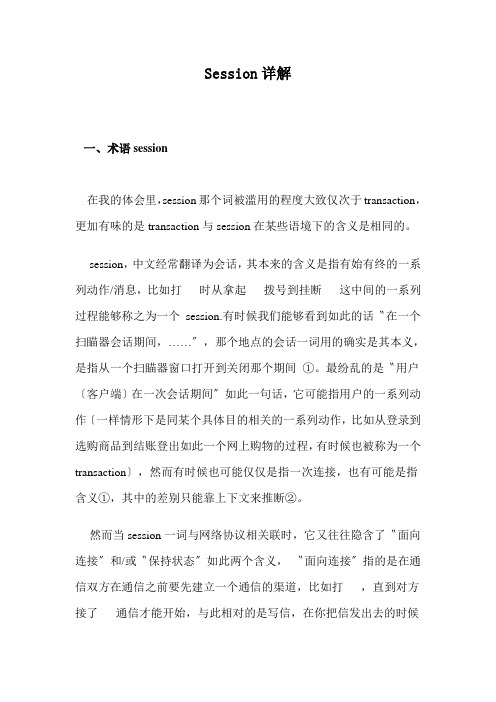
Session详解一、术语session在我的体会里,session那个词被滥用的程度大致仅次于transaction,更加有味的是transaction与session在某些语境下的含义是相同的。
session,中文经常翻译为会话,其本来的含义是指有始有终的一系列动作/消息,比如打时从拿起拨号到挂断这中间的一系列过程能够称之为一个session.有时候我们能够看到如此的话〝在一个扫瞄器会话期间,……〞,那个地点的会话一词用的确实是其本义,是指从一个扫瞄器窗口打开到关闭那个期间①。
最纷乱的是〝用户〔客户端〕在一次会话期间〞如此一句话,它可能指用户的一系列动作〔一样情形下是同某个具体目的相关的一系列动作,比如从登录到选购商品到结账登出如此一个网上购物的过程,有时候也被称为一个transaction〕,然而有时候也可能仅仅是指一次连接,也有可能是指含义①,其中的差别只能靠上下文来推断②。
然而当session一词与网络协议相关联时,它又往往隐含了〝面向连接〞和/或〝保持状态〞如此两个含义,〝面向连接〞指的是在通信双方在通信之前要先建立一个通信的渠道,比如打,直到对方接了通信才能开始,与此相对的是写信,在你把信发出去的时候你并不能确认对方的地址是否正确,通信渠道不一定能建立,但对发信人来说,通信差不多开始了。
〝保持状态〞那么是指通信的一方能够把一系列的消息关联起来,使得消息之间能够互相依靠,比如一个服务员能够认出再次光临的老顾客同时记得上次那个顾客还欠店里一块钱。
这一类的例子有〝一个TCP session〞或者〝一个POP3 session〞③。
而到了web服务器蓬勃进展的时代,session在web开发语境下的语义又有了新的扩展,它的含义是指一类用来在客户端与服务器之间保持状态的解决方案④。
有时候session也用来指这种解决方案的储备结构,如〝把xxx储存在session 里〞⑤。
由于各种用于web开发的语言在一定程度上都提供了对这种解决方案的支持,因此在某种特定语言的语境下,session也被用来指代该语言的解决方案,比如经常把Java里提供的javax.servlet. . Session简称为session⑥。
初中英语不规则动词表,分类更好记!
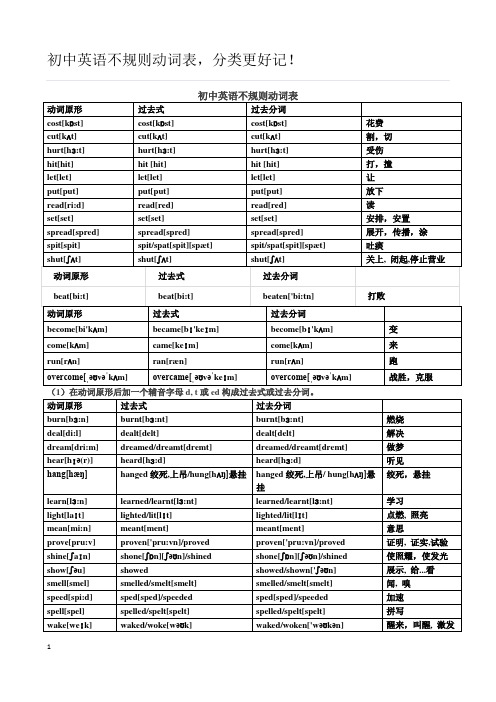
(6)原形→+lt/pt/ft→+lt/pt/ft 动词原形 feel['fi:l] keep[ki:p] leave[li:v] sleep[sli:p] sweep[swi:p] oversleep[ˌəʊvəˈsli:p] 过去式 felt[felt] kept[kept] left[left] slept[slept] swept[swept] overslept[ˌəʊvə'slept] 过去分词 felt[felt] kept[kept] left[left] slept[slept] swept[swept] overslept[ˌəʊvə'slept] 感到 保持 离开 睡觉 扫 睡过头
(1)在动词原形后加一个辅音字母 d, t 或 ed 构成过去式或过去分词。 过去式 burnt[bɜ:nt] dealt[delt] dreamed/dreamt[dremt] heard[hɜ:d] hanged 绞死,上吊/hung[hʌŋ]悬挂 learned/learnt[lɜ:nt] lighted/lit[lɪt] meant[ment] proven['pru:vn]/proved shone[ʃɒn][ʃəʊn]/shined showed smelled/smelt[smelt] sped[sped]/speeded spelled/spelt[spelt] waked/woke[wəʊk]
2
(7) 其它 动词原形 lay[leɪ] pay[peɪ] say[seɪ] stand[stænd] understand[ʌndə'stænd] lose[lu:z] have[hæv] [həv] make[meɪk] sell[sel] tell[tel] retell[ri:'tel] 过去式 laid[leɪd] paid[peɪd] said[sed] stood[stʊd] understood[ʌndə'stʊd] lost[lɒst] had[hæd, həd, əd] made[meɪd] sold[səʊld] told[təʊld] retold[ri:'təʊld] 过去分词 laid[leɪd] paid[peɪd] said[sed] stood[stʊd] understood[ʌndə'stʊd] lost[lɒst] had[hæd, həd, əd] made[meɪd] sold[səʊld] told[təʊld] retold[ri:'təʊld] 下蛋, 放置 付 说 站 理解,明白 失去 有 制造 卖 告诉 重讲,重复,复述
中国区TEDx活动(至少3场)[讲者调查分析报告]
![中国区TEDx活动(至少3场)[讲者调查分析报告]](https://img.taocdn.com/s3/m/cbcae529a5e9856a57126001.png)
从我找到的十多份TEDx 活动中,我选取了其中的三份作为我这份分析报告的主角。
一、 TEDxShanghai 第一次聚会时间:2009-06-15地点:福州路腾飞大厦讲者如下:1.毛向辉(Isaac Mao)演讲主题:《分享主义的哲学》讲者头衔:毛向辉,风险投资家,知名Blogger,创始人,群智基金创始人,ITVC合伙人。
“互联教育体系”的创立者,“坚定不移的E-learning 布道者”,同时也被人称为中国博客第一人。
简介:毛向辉早期在英特尔担任软件架构师,其后创建软件企业,并转型为风险投资家,参与大陆多项知名科技项目投资。
毛向辉也是自由文化和社会化网络领域活跃的社会活动家和学者。
现任哈佛伯克曼网络与社会研究中心访问学者,研究分享主义理论。
毛向辉是全球之声在线(Global Voices Online),Tor项目等几个活跃的国际非营利网络组织的顾问或董事成员,并担任数项国际性网络科技竞赛活动的评委。
他也活跃在国际性网络科技会议和活动中,以双语发表分享主义理论、社会化网络趋势以及中国网络发展的洞察和见解。
讲者所在领域:互联网2.Mihela.Hladin演讲主题:《常识列表》讲者头衔:Mihela.Hladin,伊索泰和(上海)环境保护技术咨询有限公司的总经理。
简介:她来自只有两百万人口的斯洛文尼亚小国,却怀抱着要将环保和幸福带到普通中国人生活中的理想,开创了自己的环保事业公司格诺威特。
几年的时间里,她深入到中国的许多企业,详细了解了中国有色金属企业和电力企业的环境保护状况,并承担了几家企业的脱硫和污水治理等环境保护项目。
所在领域:环保企业3.安猪演讲主题:《多背一公斤:旅行如何改变世界》讲者头衔:安猪,“多背一公斤”公益项目创始人。
真名余志海,70后的广东青年,双鱼座。
热爱旅行。
简介:安猪的足迹遍及中国西南大部分省份,也因此“发明”了多背一公斤。
最初多背一公斤只是他的业余爱好,但最终安猪还是选择了成为全职的公益人,以社会企业家的身份领导和运作多背一公斤。
伦理学session3

案例3:处女生子
• 英国圣公会女牧师LesFra bibliotekey Northrup身体 健康,未婚,通过人工授精生出一个男 孩,受到责难。但她错在哪里?通奸, 婚外性行为?将男人排除在外?将上帝 排除在外?
同性恋生子
• 设两个女同性恋者A和B。她们想要一个女孩, 但女孩需继承她们两个的遗传物质。办法是, 用激素刺激她们卵巢,取得卵后用供体的的精 子受精,A获得10个胚胎,9女1男;而B获得6 个女胎。然后将A的6个女胎与B的6个女胎融 合,形成6个新胚胎。选择两个胚胎植入各自 子宫内。检查表明,这两个胚胎都带有她们两 个人的基因。几个月后她们各自生出一个女孩。 她们与孪生姐妹完全一样。
• Ideal Autonomy: an achievement that serves as a goal to which we might aspire and according to which a person is maximally authentic and free of manipulative, self-distorting
• Freedom vs. Autonomy: the ability to act—particular acts; the independence and authenticity of the desires (values, emotions, etc.) — states of a person;
辅助生殖伦理问题(总论)
• 自主选择 • 最佳利益 • 第三方的介入 • 商业化 • 胚胎、胎儿和尸体的利用 • 服务分配的公正
自主选择
• 不育者的自主选择:妇女是不是在压力(丈夫、家 庭)下被迫来接受辅助生殖技术?
动词的变化规则(动词三单,过去式,ing形式)
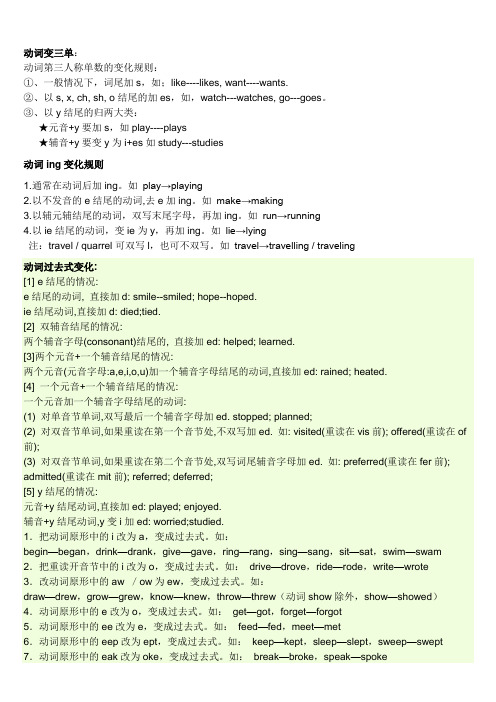
动词变三单:动词第三人称单数的变化规则:①、一般情况下,词尾加s,如;like----likes, want----wants.②、以s, x, ch, sh, o结尾的加es,如,watch---watches, go---goes。
③、以y结尾的归两大类:★元音+y要加s,如play----plays★辅音+y要变y为i+es如study---studies动词ing变化规则1.通常在动词后加ing。
如play→playing2.以不发音的e结尾的动词,去e加ing。
如make→making3.以辅元辅结尾的动词,双写末尾字母,再加ing。
如run→running4.以ie结尾的动词,变ie为y,再加ing。
如lie→lying注:travel / quarrel可双写l,也可不双写。
如travel→travelling / traveling动词过去式变化:[1] e结尾的情况:e结尾的动词, 直接加d: smile--smiled; hope--hoped.ie结尾动词,直接加d: died;tied.[2] 双辅音结尾的情况:两个辅音字母(consonant)结尾的, 直接加ed: helped; learned.[3]两个元音+一个辅音结尾的情况:两个元音(元音字母:a,e,i,o,u)加一个辅音字母结尾的动词,直接加ed: rained; heated.[4] 一个元音+一个辅音结尾的情况:一个元音加一个辅音字母结尾的动词:(1) 对单音节单词,双写最后一个辅音字母加ed. stopped; planned;(2) 对双音节单词,如果重读在第一个音节处,不双写加ed. 如: visited(重读在vis前); offered(重读在of 前);(3) 对双音节单词,如果重读在第二个音节处,双写词尾辅音字母加ed. 如: preferred(重读在fer前); admitted(重读在mit前); referred; deferred;[5] y结尾的情况:元音+y结尾动词,直接加ed: played; enjoyed.辅音+y结尾动词,y变i加ed: worried;studied.1.把动词原形中的i改为a,变成过去式。
高中英语我为湖北胖三斤 语法填空
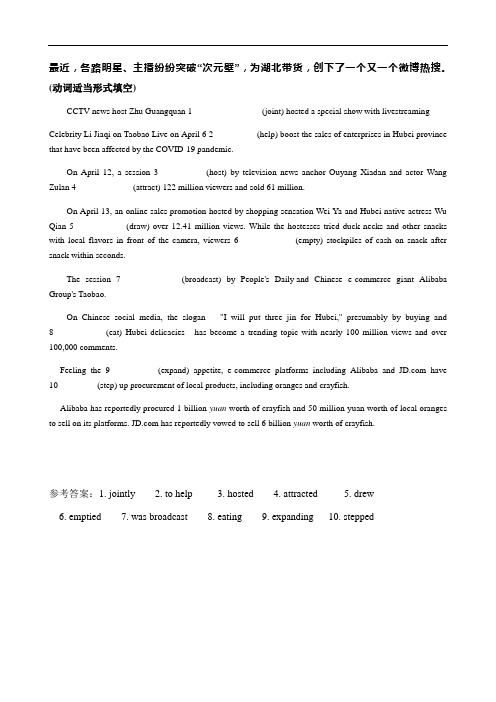
最近,各路明星、主播纷纷突破“次元壁”,为湖北带货,创下了一个又一个微博热搜。
(动词适当形式填空)CCTV news host Zhu Guangquan 1________________(joint) hosted a special show with livestreamingCelebrity Li Jiaqi on Taobao Live on April 6 2__________(help) boost the sales of enterprises in Hubei province that have been affected by the COVID-19 pandemic.On April 12, a session 3___________(host) by television news anchor Ouyang Xiadan and actor Wang Zulan 4_____________(attract) 122 million viewers and sold 61 million.On April 13, an online sales promotion hosted by shopping sensation Wei Ya and Hubei native actress Wu Qian 5____________(draw) over 12.41 million views. While the hostesses tried duck necks and other snacks with local flavors in front of the camera, viewers 6_____________(empty) stockpiles of cash on snack after snack within seconds.The session 7______________(broadcast) by People's Daily and Chinese e-commerce giant Alibaba Group's Taobao.On Chinese social media, the slogan -- "I will put three jin for Hubei," presumably by buying and 8____________(eat) Hubei delicacies - has become a trending topic with nearly 100 million views and over 100,000 comments.Feeling the 9___________(expand) appetite, e-commerce platforms including Alibaba and have 10_________(step) up procurement of local products, including oranges and crayfish.Alibaba has reportedly procured 1 billion yuan worth of crayfish and 50 million yuan worth of local oranges to sell on its platforms. has reportedly vowed to sell 6 billion yuan worth of crayfish.参考答案:1. jointly 2. to help 3. hosted 4. attracted 5. drew6. emptied7. was broadcast8. eating9. expanding 10. stepped。
2019-2020新课堂英语选修八北师大版讲义:Unit 23-3 Word版含答案
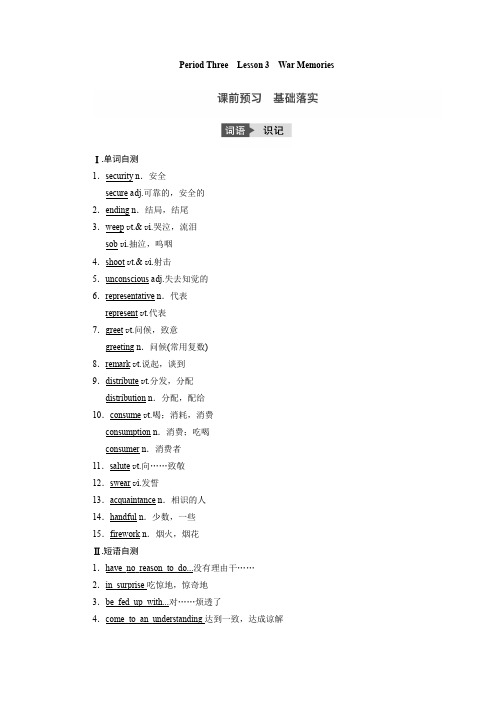
Period Three Lesson 3War MemoriesⅠ.单词自测1.security n.安全secure adj.可靠的,安全的2.ending n.结局,结尾3.weep v t.& v i.哭泣,流泪sob v i.抽泣,呜咽4.shoot v t.& v i.射击5.unconscious adj.失去知觉的6.representative n.代表represent v t.代表7.greet v t.问候,致意greeting n.问候(常用复数)8.remark v t.说起,谈到9.distribute v t.分发,分配distribution n.分配,配给10.consume v t.喝;消耗,消费consumption n.消费;吃喝consumer n.消费者11.salute v t.向……致敬12.swear v i.发誓13.acquaintance n.相识的人14.handful n.少数,一些15.firework n.烟火,烟花Ⅱ.短语自测1.have_no_reason_to_do...没有理由干……2.in_surprise吃惊地,惊奇地3.be_fed_up_with...对……烦透了4.come_to_an_understanding达到一致,达成谅解5.in_peace和平地6.turn_sb.off令某人厌烦/反感7.more_or_less或多或少,几乎8.take_sb.in_one's_arms拥抱某人9.get_through打通(电话);完成;通过10.a_handful_of少量的1.One of their men,speaking in English,remarked_that he had worked in England for some years and_that he was fed up to the neck with this war and would be glad when it was over.他们之中有一个人会说英语,他说他在英格兰工作过好几年,他对这场讨厌的战争烦透了,如果战争结束他会感到高兴的。
关于session的详细解释

介绍一篇关于session的好文章来源:Java家())摘要:虽然session机制在web应用程序中被采用已经很长时间了,但是仍然有很多人不清楚session机制的本质,以至不能正确的应用这一技术。
本文将详细讨论session的工作机制并且对在Java web application中应用session机制时常见的问题作出解答。
目录:一、术语session二、HTTP协议与状态保持三、理解cookie机制四、理解session机制五、理解javax.servlet.http.HttpSession六、HttpSession常见问题七、跨应用程序的session共享八、总结参考文档一、术语session在我的经验里,session这个词被滥用的程度大概仅次于transaction,更加有趣的是transaction 与session在某些语境下的含义是相同的。
session,中文经常翻译为会话,其本来的含义是指有始有终的一系列动作/消息,比如打电话时从拿起电话拨号到挂断电话这中间的一系列过程可以称之为一个 session。
有时候我们可以看到这样的话“在一个浏览器会话期间,...”,这里的会话一词用的就是其本义,是指从一个浏览器窗口打开到关闭这个期间①。
最混乱的是“用户(客户端)在一次会话期间”这样一句话,它可能指用户的一系列动作(一般情况下是同某个具体目的相关的一系列动作,比如从登录到选购商品到结账登出这样一个网上购物的过程,有时候也被称为一个transaction),然而有时候也可能仅仅是指一次连接,也有可能是指含义①,其中的差别只能靠上下文来推断②。
然而当session一词与网络协议相关联时,它又往往隐含了“面向连接”和/或“保持状态”这样两个含义, “面向连接”指的是在通信双方在通信之前要先建立一个通信的渠道,比如打电话,直到对方接了电话通信才能开始,与此相对的是写信,在你把信发出去的时候你并不能确认对方的地址是否正确,通信渠道不一定能建立,但对发信人来说,通信已经开始了。
第三人称动词的变化规则及例句用法总结
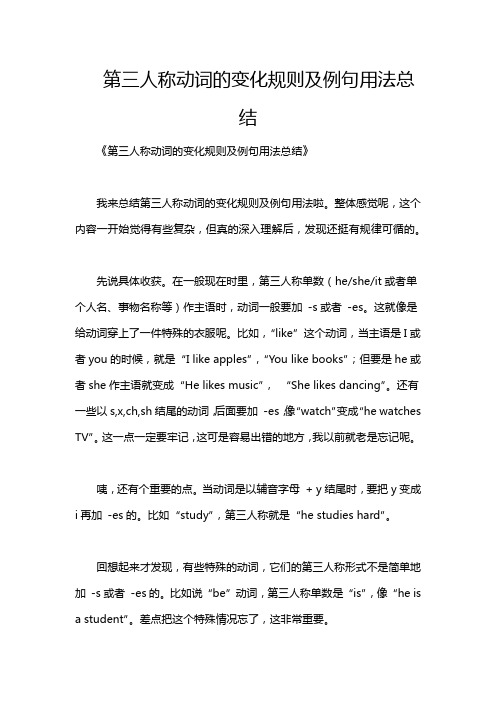
第三人称动词的变化规则及例句用法总结《第三人称动词的变化规则及例句用法总结》我来总结第三人称动词的变化规则及例句用法啦。
整体感觉呢,这个内容一开始觉得有些复杂,但真的深入理解后,发现还挺有规律可循的。
先说具体收获。
在一般现在时里,第三人称单数(he/she/it或者单个人名、事物名称等)作主语时,动词一般要加-s或者-es。
这就像是给动词穿上了一件特殊的衣服呢。
比如,“like”这个动词,当主语是I或者you的时候,就是“I like apples”,“You like books”;但要是he或者she作主语就变成“He likes music”,“She likes dancing”。
还有一些以s,x,ch,sh结尾的动词,后面要加-es,像“watch”变成“he watches TV”。
这一点一定要牢记,这可是容易出错的地方,我以前就老是忘记呢。
咦,还有个重要的点。
当动词是以辅音字母+ y结尾时,要把y变成i再加-es的。
比如“study”,第三人称就是“he studies hard”。
回想起来才发现,有些特殊的动词,它们的第三人称形式不是简单地加-s或者-es的。
比如说“be”动词,第三人称单数是“is”,像“he is a student”。
差点把这个特殊情况忘了,这非常重要。
现在想想,关于例句用法呢,在句子中,通过第三人称动词的正确使用,就能清晰地表达出关于第三人称主语的动作或者状态了。
而且它和其他时态一起使用的时候,也需要注意。
比如在现在进行时里,第三人称就是“is +动词的现在分词形式”,例如“he is reading a book”;在一般过去时里就是动词的过去式,“he played football yesterday”。
不过现在总结的重点是一般现在时的第三人称动词变化啦。
说说反思。
之前我在学习的时候,没有系统地把这些规则整理出来,做题的时候就总犯错。
现在明白了,把这些规则按照规律分类整理,再加上具体的例句来记忆,要方便很多。
session
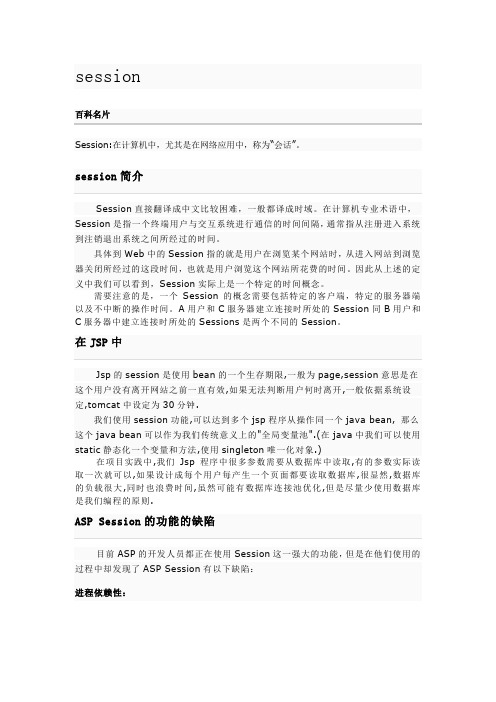
sessionSession:在计算机中,尤其是在网络应用中,称为“会话”。
Session直接翻译成中文比较困难,一般都译成时域。
在计算机专业术语中,Session是指一个终端用户与交互系统进行通信的时间间隔,通常指从注册进入系统到注销退出系统之间所经过的时间。
具体到Web中的Session指的就是用户在浏览某个网站时,从进入网站到浏览器关闭所经过的这段时间,也就是用户浏览这个网站所花费的时间。
因此从上述的定义中我们可以看到,Session实际上是一个特定的时间概念。
需要注意的是,一个Session的概念需要包括特定的客户端,特定的服务器端以及不中断的操作时间。
A用户和C服务器建立连接时所处的Session同B用户和Jsp的session是使用bean的一个生存期限,一般为page,session意思是在这个用户没有离开网站之前一直有效,如果无法判断用户何时离开,一般依据系统设定,tomcat中设定为30分钟.我们使用session功能,可以达到多个jsp程序从操作同一个java bean, 那么这个java bean可以作为我们传统意义上的"全局变量池".(在java中我们可以使用static静态化一个变量和方法,使用singleton唯一化对象.)在项目实践中,我们Jsp程序中很多参数需要从数据库中读取,有的参数实际读取一次就可以,如果设计成每个用户每产生一个页面都要读取数据库,很显然,数据库的负载很大,同时也浪费时间,虽然可能有数据库连接池优化,但是尽量少使用数据库是我们编程的原则.目前ASP的开发人员都正在使用Session这一强大的功能,但是在他们使用的过程中却发现了ASP Session有以下缺陷:进程依赖性:ASP Session状态存于IIS的进程中,也就是inetinfo.exe这个程序。
所以当inetinfo.exe进程崩溃时,这些信息也就丢失。
另外,重起或者关闭IIS服务都会造成信息的丢失。
不规则动词短暂性动词与延续性动词转化

一、不规则动词表二、注意下列动词后的不同动词形式:1.使役动词:(使役动词后只有1种形式:即省to的不定式)let (让) + sb + domake(使)have(要)2.下列动词后只能跟ing形式:1) finish (完成)enjoy (喜欢)spend(花费)+doingpractise(练习)mind(介意)consider(考虑)2) be busy(忙于)feel like(想要) +doingput off(推迟)3.感官动词:(感官动词后可以有2种不同形式)see( 看见)watch(观看)hear(听见) + sb + do (表动作已完成)/doing(表动作正在进行中)feel(感觉)notice(注意)find(找到)4. 下列动词后可以有2种不同形式:1) 意义差别不大start(开始)begin(开始)like(喜欢)+ to do/doinglove (喜爱)2) 意义有区别:sto p to do sth 停下来去做……doing sth 停止做…forget to do sth 忘记去做……doing sth 忘记做了……lie与lay的区别lie: 平躺过去式lay, 过去分词lain , 现在分词lyinglie: 说谎过去式lied, 过去分词lied , 现在分词lyinglay: 安放过去式laid, 过去分词laid, 现在分词laying三、短暂性动词与延续性动词的转换1. borrow keep have kept2. get to know know have known3. catch a cold have a cold have had a cold4. buy have have had5. die be dead have been dead6. open be open have been open7. close be closed have been closed8. get married be married have been married9. fall ill be ill have been ill10. fall asleep be asleep have been asleep11. leave sp. Be away from sp. Have been away from sp.12. return be back have been back13. go to bed be in bed have been in bed14. come to the island be on the island have been on the island15. go to sp./come to sp. Be in sp. Have been in sp.16. come here be here have been here17. go there be there have been there18. go out be out have been out19. get up be up have been up20. start/ begin be on have been on21. finish/ end be over have been over22. become be have been23. join be a member of have been a member ofBe in have been inarrive→be here begin(start)→be ondie →be dead come back→be backleave →be away (from) fall ill(sick, asleep)→be ill(sick, asleep) get up→be up go out →be outfinish →be over put on →wear 或be onopen →be open join →be in或be a member of…close →be closed go to school→be a studentborrow →keep buy/get →havecatch(a cold)→have(a cold) get to know →knowbegin to study→study come to work→workmove to →live in finish/end →be overcome to →be in sit down →be seated marry →be married dress →be dressed等(英文版)Two regulations promulgated for implementation is in the party in power for a long time and the rule of law conditions, the implementation of comprehensive strictly strategic plan, implementation in accordance with the rules and discipline to manage the party, strengthen inner-party supervision of major initiatives. The two regulations supporting each other, the < code > adhere to a positive advocate, focusing on morality is of Party members and Party leading cadres can see, enough to get a high standard; < rule > around the party discipline, disciplinary ruler requirements, listed as "negative list, focusing on vertical gauge, draw the party organizations and Party members do not touch the" bottom line ". Here, the main from four square face two party rules of interpretation: the first part introduces two party Revised regulations the necessity and the revis ion process; the second part is the interpretation of the two fundamental principles of the revision of laws and regulations in the party; the third part introduces two party regulations modified the main changes and needs to grasp several key problems; the fourth part on how to grasp the implementation of the two regulations of the party. < code > and < Regulations > revised the necessity and revised history of the CPC Central Committee the amendment to the Chinese Communist Party members and leading cadres honest politics several guidelines > and < Chinese Communist Party discipline and Punishment Regulations > column 1 by 2015 to strengthenparty laws and regulations focus. Two party regulations revision work lasted a Y ears, pooling the wisdom of the whole party, ideological consensus, draw historical experience, respect for the wisdom of our predecessors, which reflects the unity of inheritance and innovation; follow the correct direction, grasp the limited goals, adhere to the party's leadership, to solve the masses of the people reflect a focus on the problem. The new revision of the < code > and < rule >, reflects the party's 18 and the eighth session of the third, the spirit of the fourth plenary session, reflecting the experience of studying and implementing the General Secretary Xi Jinping series of important speech, reflects the party's eighteen years comprehensive strictly practice. (a) revised two regulations of the party need of < the ICAC guidelines > in < in 1997 Leaders as members of the Communist Party of China clean politics certain criteria (Trial) > based on revised, the promulgation and implementation of January 2010, to strengthen the construction of the contingent of leading cadres play an important role. But with the party to manage the party strictly administering the deepening, has not been able to fully meet the actual needs. Content is too complicated, "eight prohibition, 52 are not allowed to" hard to remember, and also difficult to put into practice; the second is concisely positive advocated by the lack of prohibited provisions excessive, no autonomy requirements; the third is banned terms and discipline law, both with the party discipline, disciplinary regulationsrepeat and Criminal law and other laws and regulations repeat; the fourth is to "clean" the theme is not prominent, not for the existing problems, and is narrow, only needle of county-level leading cadres above. < rule > is in 1997 < Chinese Communist Party disciplinary cases (Trial) > based on revision, in December 2003 the promulgation and implementation, to strengthen the construction of the party play very important role. Along with the development of the situation, which many provisions have been unable to fully meet the comprehensive strictly administering the practice needs. One is Ji law, more than half of the provisions and criminal law and other countries laws and regulations Repetition; two is the political discipline regulations is not prominent, not specific, for violation of the party constitution, damage the authority of Party Constitution of misconduct lack necessary and serious responsibility to pursue; third is the main discipline for the leading cadres, does not cover all Party members. Based on the above situation, need to < the criterion of a clean and honest administration > and < rule > the two is likely to be more relevant regulations first amendment. By revising, really put the authority of Party discipline, the seriousness in the party tree and call up the majority of Party members and cadres of the party constitution of party compasses party consciousness. (II) two party regulations revision process the Central Committee of the Communist Party of China attaches great importance to two regulations revision . Xi Jinping, general books recorded in the FifthPlenary Session of the eighth session of the Central Commission for Discipline Inspection, on the revised regulations < > made clear instructions. According to the central deployment, the Central Commission for Discipline Inspection from 2014 under six months begin study two regulations revision. The Standing Committee of the Central Commission for Discipline Inspection 4 review revised. Comrade Wang Qishan 14 times held a special meeting to study two regulations revision, amendment clarifies the direction, major issues of principle, path and target, respectively held a forum will listen to part of the province (area) secretary of the Party committee, Secretary of the Discipline Inspection Commission, part of the central ministries and state organs DepartmentThe first party committee is mainly responsible for people, views of experts and scholars and grassroots party organizations and Party members. Approved by the Central Committee of the Communist Party of China, on 7 September 2015, the general office of the Central Committee of the Party issued a notice to solicit the provinces (autonomous regions, municipalities) Party, the central ministries and commissions, state ministries and commissions of the Party (party), the General Political Department of the military, every 3 people organization of Party of two regulations revision opinion. Central Commission for Discipline Inspection of extensive solicitation of opinions, careful study, attracting, formed a revised sent reviewers. In October 8 and October 12, Central Committee PoliticalBureau Standing Committee and the Political Bureau of the Central Committee After consideration of the two regulations revised draft. On October 18, the Central Committee of the Communist Party of China formally issued two regulations. Can say, two laws amendment concentrated the wisdom of the whole party, embodies the party. Second, < code > and < Regulations > revision of the basic principles of two party regulations revision work and implement the party's eighteen, ten eight plenary, the spirit of the Fourth Plenary Session of the Eleventh Central Committee and General Secretary Xi Jinping important instructions on the revised < low political criterion > and < Regulations >, highlighting the ruling party characteristics, serious discipline, the discipline quite in front of the law, based on the current, a long-term, advance as a whole, with Bu Xiuding independent < rule > and < rule >. Main principle is: first, adhere to the party constitution to follow. The constitution about discipline and self-discipline required specific, awaken the party constitution of party compasses party consciousness, maintaining the authority of the constitution. General Secretary Xi Jinping pointed out that "no rules, no side round. Party constitution is the fundamental law, the party must follow the general rules. In early 2015 held the eighth session of the Central Commission for Discipline Inspection Fifth Plenary Session of the 16th Central Committee, Xi Jinping again pointed out that constitution is the party must follow the general rules, but also the general rules." the revisionof the < code > and < rule > is Method in adhere to the regulations established for the purpose of combining rule of virtue is to adhere to the party constitution as a fundamental to follow, the constitution authority set up, wake up the party constitution and party rules the sense of discipline, the party constitution about discipline and self-discipline specific requirements. 4 second is to adhere to in accordance with the regulations governing the party and the party. The Party of rule of virtue "de", mainly refers to the party's ideals and beliefs, excellent traditional style. The revised the < code > closely linked to the "self-discipline", insisting on the positive initiative, for all members, highlight the "vital few", emphasized self-discipline, focusing on the morality, and the majority of Party members and the ideological and moral standards. The revised < > Ji method separately, Ji, Ji Y an to Method, as a "negative list", emphasizing the heteronomy, focusing on vertical gauge. Is this one high and one low, a positive reaction, the strict party discipline and practice results transformation for the integration of the whole party to observe moral and discipline requirements, for the majority of Party members and cadres provides benchmarking and ruler. Third, insist on to. In view of the problems existing in the party at the present stage, the main problems of Party members and cadres in the aspect of self-discipline and abide by the discipline to make clearly defined, especially the party's eighteen years strict political discipline and political rules, organization and discipline andto implement the central eight provisions of the spirit against the four winds and other requirements into Disciplinary provisions. Not one pace reachs the designated position, focusing on in line with reality, pragmatic and effective. After the revision of major changes, major changes in the < code > and < rule > modified and needs to grasp several key problems (a) < code > < code > adhere to according to regulations governing the party and party with morals in combination, for at the present stage, the leadership of the party members and cadres and Party members in existing main problems of self-discipline, put forward principles, requirements and specifications, showing Communists noble moral pursuit, reflected at all times and in all over the world ethics from high from low 5 common requirements. One is closely linked to the "self-discipline", removal and no direct relation to the provisions of . the second is adhere to a positive advocate, "eight prohibition" 52 are not allowed to "about the content of the" negative list moved into synchronization amendment < cases >. Three is for all the party members, will apply object from the leadership of the party members and cadres to expand to all Party members, fully embodies the comprehensive strictly required. The fourth is prominent key minority, seize the leadership of the party members and cadres is the key, and put forward higher requirements than the ordinary Party members. Five is to simplify, and strive to achieve concise, easy to understand, easy to remember. The revised < code > is the ruling Party since the first insists ona positive advocate forAll Party members and the self-discipline norms, moral declaration issued to all members of the party and the National People's solemn commitment. > < criterion of a clean and honest administration consists of 4 parts, 18, more than 3600 words. After the revision of the < code >, a total of eight, 281 words, including lead, specification and Party member cadre clean fingered self-discipline norms, etc. Part 3 members low-cost clean and self-discipline, the main contents can be summarized as "four must" "eight code". Lead part, reiterated on ideal and faith, fundamental purpose, the fine traditions and work style, noble sentiments, such as "four must" the principle of requirements, strong tone of self-discipline, The higher request for 6 and supervised tenet, the foothold in permanent Bao the party's advanced nature and purity, to reflect the revised standards requirements. Members of self-discipline norms around the party members how to correctly treat and deal with the "public and private", "cheap and rot" thrifty and extravagance "bitter music", put forward the "four norms". Party leader cadre clean fingered self-discipline norms for the leadership of the party members and cadres of the "vital few", around the "clean politics", from civil servant of the color, the exercise of power, moral integrity, a good family tradition and other aspects of the leadership of the party members and cadres of the "four norms" < > < norm norm. "The Party member's self-discipline norms" and "party members and leading cadre clean fingered self-discipline norms," atotal of eight, collectively referred to as the "eight". "Four must" and "eight" of the content from the party constitution and Party's several generation of leaders, especially Xi Jinping, general secretary of the important discussion, refer to the "three discipline and eight points for attention" statements, and reference some embody the Chinese nation excellent traditional culture essence of epigrams. (2) the revised regulations, the main changes in the revised Regulations > to fully adapt to the strictly requirements, reflects the according to the regulations governing the law of recognition of deepening, the realization of the discipline construction and Jin Ju. < rule > is party a ruler, members of the basic line and follow. And the majority of Party members and cadres of Party organizations at all levels should adhere to the bottom line of thinking, fear discipline, hold the bottom line, as a preventive measure, to keep the party's advanced nature and purity. 1, respect for the constitution, refinement and discipline. Revised < rule > from comprehensive comb physical constitution began, the party constitution and other regulations of the Party of Party organizations and Party discipline requirements refinement, clearly defined in violation of the party constitution will be in accordance with regulations to give the corresponding disciplinary action. The original 10 categories of misconduct, integration specification for political discipline, discipline, honesty and discipline masses Ji Law and discipline and discipline and other six categories, the content of < rule >real return to Party discipline, for the majority of Party members and listed a "negative list. 7 2, highlighting the political discipline and political rules. > < Regulations according to the stage of the discipline of outstanding performance, emphasizing political discipline and political rules, organization and discipline, in opposition to the party's leadership and the party's basic theory, basic line, basic program and basic experience, the basic requirement of behavior made prescribed punishment, increase the cliques, against the organization such as violation of the provisions, to ensure that the central government decrees and the Party of centralized and unified. 3, adhere to strict discipline in the law and discipline In front, Ji separated. Revised < Regulations > adhere to the problem oriented, do Ji separated. Any national law existing content, will not repeat the provisions, the total removal of 79 and criminal law, repeat the content of the public security management punishment law, and other laws and regulations. In the general reiterated that party organizations and Party members must conscientiously accept the party's discipline, die van comply with national laws and regulations; at the same time, to investigate violations of Party members and even criminal behavior of Party discipline and responsibility, > < Regulations distinguish five different conditions, with special provisions were made provisions, so as to realize the connection of Party discipline and state law. 4, reflect Wind building and anti-corruption struggle of the latest achievements. < rule > the party's eighteen yearsimplement the spirit of the central provisions of the eight, against the requirements of the "four winds" and transformation for disciplinary provisions, reflecting the style construction is always on the road, not a gust of wind. In the fight against corruption out of new problems, increase the trading rights, the use of authority relatives profit and other disciplinary terms. Prominent discipline of the masses, the new against the interests of the masses and ignore the demands of the masses and other disciplinary terms and make provisions of the disposition and the destruction of the party's close ties with the masses.Discipline to protect the party's purpose. 8 of these regulations, a total of three series, Chapter 15, 178, more than 24000 words, after the revision of the regulations a total of 3 series, Chapter 11, 133, 17000 words, divided into "general" and "special provisions" and "Supplementary Provisions" Part 3. Among them, add, delete, modify the provisions of the proportion of up to nearly 90%. 1, the general general is divided into five chapters. The first chapter to the regulations of the guiding ideology, principles and scope of application of the provisions, highlight the strengthening of the party constitution consciousness, maintenance the authority of Party Constitution, increase the party organizations and Party members must abide by the party constitution, Y an Centralized centralized, would examine at all levels of the amended provisions implementing and maintaining Party discipline, and consciously accept the party discipline,exemplary compliance with national laws and regulations. The second chapter of discipline concept, disciplinary action types and effects of the regulations, will be a serious warning from the original a year for a year and a half; increase the Party Congress representative, by leaving the party above (including leave probation) punishment, the party organization should be terminated its representative qualification provisions. The third chapter of the disciplinary rules of use prescribed in the discipline rectifying process, non convergence, not close hand classified as severely or heavier punishment. "Discipline straighten "At least eighteen years of five years, these five years is to pay close attention to the provisions of the central eight implementation and anti -" four winds ". The fourth chapter on suspicion of illegal party disciplinary distinguish five different conditions, with special provisions were made provisions, to achieve effective convergence of Party and country 9 method. < rule > the provisions of Article 27, Party organizations in the disciplinary review found that party members have committed embezzlement, bribery, dereliction of duty dereliction of duty and other criminal law act is suspected of committing a crime shall give cancel party posts, probation or expelled from the party. The second is < Regulations > Article 28 the provisions of Party organizations in the disciplinary review But found that party members are stipulated in the criminal law, although not involved in a crime shall be investigated for Party discipline and responsibility shouldbe depending on the specific circumstances shall be given a warning until expelled punishment. This situation and a difference is that the former regulation behavior has been suspected of a crime, the feeling is quite strict, and the latter for the behavior not involving crime, only the objective performance of the provisions of the criminal code of behavior, but the plot is a crime to slightly. < Regulations > the 29 provisions, Party organizations in the discipline review found that party members and other illegal behavior, affect the party's image, the damage to the party, the state and the people's interests, we should depend on the situation Seriousness given disciplinary action. The loss of Party members, seriously damaging the party's image of behavior, should be given expelled from the party. At this article is party member is in violation of the criminal law outside the other illegal acts, such as violates the public security administration punishment law, customs law, financial laws and regulations behavior. The fourth is < cases > Article 32 stipulates, minor party members and the circumstances of the crime, the people's Procuratorate shall make a decision not to initiate a prosecution, or the people's court shall make a conviction and exempted from criminal punishment shall be given within the party is removed from his post, probation or expelled from the party. Party members and crime, sheets were fined in accordance with For acts; the principal Ordinance amended the provisions of the preceding paragraph. This is the new content, in order to achieve Ji method effectiveconvergence. Five is < > the thirty third article 10 of the provisions, the Party member due to an intentional crime is sentenced to criminal law (including probation) sheets or additional deprivation of political rights; due to negligence crime and was sentenced to three years or more (excluding three years) a penalty, shall give expelled punishment. Due to negligence crime is convicted and sentenced to three years (including three years) in prison or be sentenced to public surveillance, detention, shall in general be expelled from the party. For the individual may not be expelled from the party, should control Approval. This is followed and retained the original > < Regulations the provisions of punishment party authorization rules and report to a level party organizations. For is "party members with criminal acts, and by the criminal punishment, generally should be expelled from the party". The fifth chapter of probationary Party member of the discipline and discipline after missing members of the treatment and punishment decisions, such as the implementation of the provisions, clear the related party discipline and punishment decision made after, for duties, wages and other relevant alteration formalities for the longest time. 2, sub sub section will the original regulations of10 categories of acts of violation of discipline integration revised into 6 categories, respectively, in violation of the punishments for acts of political discipline "in violation of discipline behavior of punishment" in violation of integrity of disciplinary action points "of violation punishments for actsof mass discipline" "the violation of work discipline, punishment" in violation of discipline of life behavior punishment "6 chapters. 3, annex" Supplementary Provisions "clear authority making supplementary provisions of, cases of interpretative organ, as well as regulations implementation time and retroactivity etc.. 11 (3) learning understanding > < regulations needs to grasp several key problems The first problem -- about the violation of political discipline behavior > < new ordinance chapter 6 the political discipline column for the six disciplines, that is the main opposition to Party leadership and the opposition of the basic theory, basic line, basic program and basic experience, basic requirements of misconduct made provisions of the disposition, especially the eighteen since the CPC Central Committee put forward the Yan Mingzheng treatment of discipline and political rules requirements and practical achievements transformation for Discipline article, increase the false debate central policies, cliques, against the organization review, make no discipline of the principle of harmony terms. These are the party's eighteen years in comprehensive strictly Process combined with the practice of rich content. (1) false debate the central policies and undermine the Party of centralized and unified the problem is made in accordance with the provisions of the party constitution. Constitution in general programme requirements adhere to democratic centralism is one of the requirements of the construction of the party must adhere to the four cardinal. Applicationof this principle is not only the party the basic organization principle and is also the mass line in party life, it requires that we must fully develop inner-party democracy, respect for the dominant position of Party members, safeguarding the Party member democratic rights, give full play to the enthusiasm and creativity of the party organizations at all levels and Party members, at the same time, also must implement the right concentration, ensure the party's mission < the chaos in unity and concerted action to ensure that the party's decision to get quickly and effectively implementing. The Party Central Committee formulated the major principles and policies, through different channels and ways, fully listen to the party organizations and Party members of the opinions and suggestions, but 12 is some people face to face not to say back blather "" will not say, after the meeting said, "" Taiwan does not say, and nonsense ", in fact, not only disrupt the people thought, some causing serious consequences, the damage to the Party of the centralized and unified, hinder the central policy implementation, but also a serious violation of the democratic system of principles. There is no doubt that shall, in accordance with the Regulations > 4 Specified in Article 6 to give the appropriate punishment. For did not cause serious consequences, to give criticism and education or the corresponding tissue processing. (2) about the destruction of the party's unity < New Regulations > the forty eighth to fifty second article, to damage Party's unity unified and violation of political discipline, punishment situation。
动词三式变化表

动词三式变化表动词三式变化1. A---A---Acost costcost花费hurt hurthurt伤put putput放下read readread读2. A---A---Bbeat beatbeaten 打3. A---B---Acome came come 来become became become 变run ran run 跑4. A ---B ---Bhave had had有hold held held盛,握leave left left离开make made made制造meet met met遇见sell sold sold卖shoot shot shot射击tell told told告诉get got got得到learn learned/learnt learned/learnt 学习hear heard heard听见build built built建筑lend lent lent借给lose lost lost失去send sent sent送spend spent spent花费pay paid paid付say said said说catch caught caught抓住teach taught taught教bring brought brought带来buy bought bought买think thought thought想sleep slept slept睡keep kept kept保持sweep swept swept扫stand stood stood站understand understood understood明白win won won得胜feel felt felt觉得find found found发现sit sat sat坐5. A---B---Ceat ate eaten 吃fall fell fallen 落下steal stole stolen 偷give gave given 给freeze froze frozen 冻结take took taken 拿see saw seen 看见write wrote written 写ride rode ridden 骑drive drove driven 驾驶throw threw thrown 抛,扔blow blew blown 吹grow grew grown 生长know knew known 知道fly flew flown 飞show showed shown 展示speak spoke spoken 说话break broke broken 破碎,折断choose chose chosen 选择forget forgot forgotten 忘记begin began begun 开始sing sang sung 唱swim swam swum 游泳drink drank drunk 饮6. 其他不规则动词的变化be(am, is , are) was/ were been是do did done 做go went gone 去wear wore worn 穿。
session与getSession()用法总结

session与getSession()⽤法总结⼀.session1.session的过期时间是从什么时候开始计算的?是从⼀登录就开始计算还是说从停⽌活动开始计算? 从session不活动的时候开始计算,如果session⼀直活动,session就总不会过期。
从该Session未被访问,开始计时; ⼀旦Session被访问,计时清0;sessionid有效期内不会变。
session 是借助 cookie 实现的。
另外,清空客户端cookie,session就会丢失。
2.设置session的失效时间,如果session还在有效期就不会重新⽣成。
web.xml中<session-config><session-timeout>30</session-timeout></session-config>//单位为分钟3.http请求时,⽆论http头指定了多少个 sessionid,最终都只能操作⼀个会话,如果指定的 sessionid 不合法,会⾃动创建新的 session⼆.request.getSession()的⽤法进⾏总结:在javaweb项⽬中,⽤到request.getSession()⼀般是存储信息到session中或者从session中获取信息。
⼀般有三种参数设置⽅式:1.request.getSession()这是常⽤的⽅式,从当前request中获取session,如果获取不到session,则会⾃动创建⼀个session,默认为true,并返回新创建的session;如果获取到,则返回获取到的session;2.request.getSession(true)这种⽅法和第⼀种⼀样,只是增家了⼀个true参数,告诉它在获取不到的时候⾃动创建session;3.request.getSession(false)这种⽅法与上两种的区别,就是在获取不到session的时候,不会⾃动创建session,⽽是会返回null。
小学三年级教案学习颜色和形状的英文表达

小学三年级教案学习颜色和形状的英文表达In this article, we will explore an English teaching plan for elementary school third-grade students to learn the vocabulary for different colors and shapes. The plan is divided into four sessions, and each session focuses on a specific color or shape.Session 1: Circle and RedIn this session, the teacher will introduce the vocabulary for circle and red to the students. First, the teacher will show the students a circle and ask them to repeat the word "circle" after her. Then, the teacher will display a red object and say the word "red," followed by asking the students to repeat the word. Next, the teacher will show the students objects that are both red and circular, such as apples, and ask them to name the objects using the appropriate vocabulary. Finally, the teacher will ask the students to draw a red circle on a piece of paper and say the word out loud.Session 2: Square and BlueIn this session, the teacher will introduce the vocabulary for square and blue to the students. The teacher will follow the same format as session 1, but with different vocabulary. The teacher will show the students a square and ask them to repeat the word "square" after her. Then, the teacher will display a blue object and say the word "blue," followed by asking the students to repeat the word. Next, the teacher will show the students objects that are both blue and square, such as building blocks, and ask them to name the objects using the appropriate vocabulary. Finally, the teacher will ask the students to draw a blue square on a piece of paper and say the word out loud.Session 3: Triangle and YellowIn this session, the teacher will introduce the vocabulary for triangle and yellow to the students. The teacher will follow the same format as session 1 and 2, but with different vocabulary. The teacher will show the students a triangle and ask them to repeat the word "triangle" after her. Then, the teacher will display a yellow object and say the word "yellow," followed by asking the students to repeat the word. Next, the teacher will show the students objects that are both yellow and triangular, such as pizza slices, and ask them to name the objects using the appropriate vocabulary. Finally, the teacher will ask the students to draw a yellow triangle on a piece of paper and say the word out loud.Session 4: Rectangle and GreenIn this session, the teacher will introduce the vocabulary for rectangle and green to the students. The teacher will follow the same format as the previous three sessions. The teacher will show the students a rectangle and ask them to repeat the word "rectangle" after her. Then, the teacher will display a green object and say the word "green," followed by asking the students to repeat the word. Next, the teacher will show the students objects that are both green and rectangular, such as books, and ask them to name the objects using the appropriate vocabulary. Finally, the teacher will ask the students to draw a green rectangle on a piece of paper and say the word out loud.ConclusionBy the end of these four sessions, the students should have a basic understanding of the vocabulary for different colors and shapes in English.The teacher can reinforce the new vocabulary in future lessons and activities to ensure that the students remember it. By incorporating fun and interactive activities, the students will more easily retain the new vocabulary and enjoy learning English.。
动词的“三单”,ing,和过去式变化规则

动词的第三人称单数的单数及发音规则:1.一般直接在此为加—s,—s在清辅音后读/s/,在浊辅音或元音后读/z/,ds读/dz/, ts读/ts如help helps/s/ know knows/z/ get gets/s/ read reads/z/2.以字母s,x, ch,sh或有些以o 结尾的动词加-es,—es 读/iz/,如guess guesses fix fixes teach teaches wash washes注意:go goes/z/ do does /z/3.辅音字母+y结尾的动词,先变y为i,再加—es,—ies读/iz/carry carries fly flies注意:在play-—-plays,say--—-says中,字母y前为元音字母,第三人称单数形式直接在动词后加—s4.特俗词例外5.be动词的第三人称单数分别为am, is, are, have则为has注意:以不发音字母“e”结尾的开音节词,如果尾音是/s/,/z/,加—s后,字母”e”发音,与所加—s一起读作/iz/,如close closes/iz/动词的ing变化规则:1.一般情况直接加ing,如look-looking go---going visit-——visiting2.以不发音的e结尾的,去e再加ing,如come—--coming make—-—making write—-—writing3.以重读闭音节结尾并且只有一个辅音字母的,双写该辅音字母,再加ing,如run---running stop---stopping get—-—getting swim—-—swimming begin-—-beginning 4.以辅音字母加y结尾的,直接加ing,如study---studying carry-——carrying fly--—flying cry-—-crying5.以ie结尾的重度开音节动词,先变ie为y,再加ing,如die-—-dying tie--—tying lie———lying动词的过去式变化规则:1.规则变化(1)一般直接在动词后加ed,—ed在清辅音后读/t/, 在浊辅音及元音后读/d,/—ed在/t//d/后读/id/,如call-—-called open——-opened look———looked want--—wanted /id/ need-——needed /id/(2)以不发音的“e"结尾的,直接加-d ,如live-——lived move-——moved hope-——hoped(3)以辅音字母加y结尾的动词,先变y为i,再加—ed,(注意:如果是元音字母加y 结尾的,还是直接加—ed,如,play—-—played, enjoy-—-enjoyed)如study--—studied cry---cried try—-—tried(4)以一个辅音字母结尾的重读闭音节动词,双写最后一个辅音字母,再加—ed,如plan———planned fit——-fitted stop-—-stopped2.不规则变化(要特俗记忆),以下是一些常见的动词的过去式am,is-was are-were, do-did,see—saw, say-said,give-gave, get—got, go-went come—came have/has-had eat-ate,take-took run—ran put—put make—made read—read write—wrote draw-drew drink—drankfly—flew ride—rode speak-spoke sweep—swept swim-swamsit-sat hear— heard sleep—slept let-letblow-blew hurt-hurt speak—spoke buy—bought keep-kept swim-swameat-atecatch-caught know-knew stand-stood choose—chose lie-lay leave-left draw—drewteach –taught drink-drank make- made tell-told think—thought mean-meant feel—felt drive—drove meet—met write –wrote find—found fly—flewforget -forgot ring -rang see —saw ride—rodegrow—grew sing—sang/sung begin—began learn-learned/learnt可数名词变复数的规则:1.规则变化:(1)一般情况下,在词尾加-s,如book-——books boy-—-boys(2)以—s, -x,-ch, -sh结尾的名词,在词尾加-es,如bus—--buses watch--—watches (3)以辅音字母加y结尾的,变y为i,再加—es, 如city—--cities family———families(4)以—f或-fe结尾的分两类,一类直接加-s,另一类大多数情况下,将—f或-fe改为v,再加—es,如,roof-——roofs belief———beliefs leaf—-—leaves life—--lives knife—--knives2.不规则变化(1)元音字母发生变化man-——men tooth—--teeth goose---geese(2)词尾变化child-—-children mouse-—-mice(3)单复数同形sheep---sheep deer—--deer fish———fish另附清辅音与浊辅音:清辅音:[p] [t] [k] [f][s] [θ][∫][ts][t∫] [tr][h]浊辅音:[b] [d][g][v] [z] [δ][з] [dz][dз] [dr][r]音节分为开音节和闭音节,3.开音节又分为相对开音节和绝对开音节(1)相对开音节:“以一个元音字母+一个辅音字母(r除外)+不发音的e”结尾的叫相对开音节。
动词三单形式、现在分词、过去式、过去分词变化规律
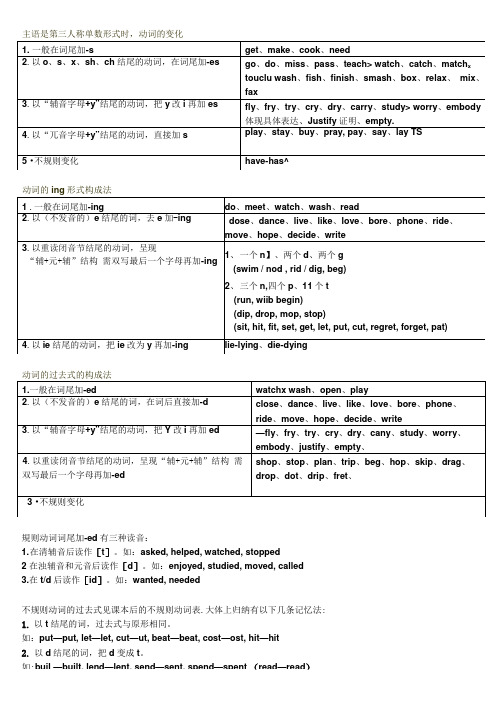
主语是第三人称单数形式时,动词的变化动词的ing形式构成法动词的过去式的构成法規则动词词尾加-ed有三种读音:1. 在清辅音后读作[t]。
如:asked, helped, watched, stopped2 在浊辅音和元音后读作[d]。
如:enjoyed, studied, moved, called3.在t/d后读作[id]。
如:wanted, needed不规则动词的过去式见课本后的不规则动词表.大体上归纳有以下几条记忆法: 1.以t结尾的词,过去式与原形相同。
如:put—put, let—let, cut—ut, beat—beat, cost—ost, hit—hit2.以d结尾的词,把d变成t。
如:buil —built, lend—lent, send—sent, spend—spent (read—read)3.以n结尾的词,在词后加t。
如:mean― eant, burn—burnt, learn—learnt4.以ow/ aw结尾的词,把ow / aw变成ew •如:blow—blew, draw— rew, know—knew, grow—grew, throw—threw5.含有双写字母的词,将双写改为单写,在词尾加t。
如:keep—kept, sleep—slept, feel—felt, smell—smelt, sweep—swept6 .只去掉一个e:feed—fed, meet—met7. 闭音节词,改i为a。
如:sit—sat, swim―swam, ring—rang, drink—rank, sing—sang, begin— egan,8. 开音节词,改i为。
如:drive~ rove, ride—rode, write—wrote,9. buy—bought, bring—brought, think—thought, catchaught, teach—taughty-laid, say-said, pay-paid 母鸡“下蛋”并“摆放”好后,“说”,“付钱”11.is/am—was, are—were, have/has—had, do— id, go—went, run—ran, see—saw, fly—flew, get― ot, win—won, eat—te, come—came, make—made, tell—told, take—took, fall—fell, speak—spoke, wear—wore, stand—stood, become— ecame, forget—forgot, hear— eard, can—could, will—would, shall—should, find—found不规则动词的过去分词变化形式1、AAA动词原形,过去式, 过去分词相同cost —cost ——cost cut ——cut—cut hit ---hit——hitlet —-let —let shut ——shut —shut put —-put —put read -read ——readspread— spread——spreadhurt ---hurt ---hurtset ——set ——set2、ABA动词原形与过去分词相同become became ------------------ become come——came come run—ran——run3、动词过去分词有两个burn ---burued/burut---burned/burut learn —-learned/learnt ---lea rued/learnt spell ——spelled/spelt ——spelled/spelt dream---dreanied/dreamt ---dreamed/dreamt smell —smelled/smelt —snielled/smelt4、在动词原形后加- en/n构成过去分词be—was/we re—beenride —rode——ridden fall---fell—fallensee——saw -seen draw—drew—drawn show——showed—shown beat ------ beat——beatenrise ——rose——risengive——gave ——giventake---took—takengrow -grew——grownthrow-—threw——throwndrive ---drove——driveneat——ate ------ e atenshake ——shook---shakenblow—blew -blown know -knew——known write—wrote---written5、动词原形i过去式a过去分词iibegin began——begun sing —sang ——sungswim ——swain ——swum drink ——drank——dninkring ——rang—nmg6、在过去式后加11构成过去分词break---broke ---broken forget forgot---forgotten choose—chose—chosen freeze—froze——frozen hide—hid---hidden speak—spoke—spoken steal—stolestolen wake—woke—woken wear——wore——worn7、动词过去式与过去分词相同bring —brought —brought buy ---bought —bought fight —fought ---foughtthink ---thoughtthought catch ---caught —caught teacli taught ---taught dig—dugdug feed—fed——fed find—found---found get——got——got hang——hung——hung hear—heard---heard hold——held——held keep-—kept——kept lay—laid---laidlead---led---led leave——left——left lend—lent—-lentlose-—lost—lost make——made-—made mean——meant—meant meet—met——met pay—paid--paid say---said—saidsell---sold—sold send——sent—sent shine——shone——shone sit——sat——sat sleep——slept——slept spend -spent -spentsta nd——stood—stood stick——stuck——stuck sweep -swept—swepttell---told——told understand——understood--- understoodwin——won—won feel—felt—felt have——had——had8、特殊记忆do-—did—done go---went---gone动词过去式/过去分词不规则变化 AB 型 can — could AAA 型cost —cost —cost let — let — let shut — sluit — shut AAB 型beat — beat beaten ABA 型become became become shall —shouldwill ——wouldmay — mightcome came come cut — cut — cut must — must — must read ——read ——readhit — hit — hit put — put — puthurt — hurt — hurt set ——set — setnm ran run ABB 型 bring brought brought buy bought bought think thought thought catch caught caught teach taught taught build built built lend lent lent send sent sent spend spent spent dig dug dug hang hung hung feel felt felt keep kept kept sleep slept slept sweep swept swept leave left left smell smelt smelt spill spilt spilt lay laid laid pay paid paid say said said sell sold sold tell told toldsit sat sat spit spat spat stand stood stood understand understood understood learn learnt learnt mean meant meant spoil spoilt spoilt shine shone shone win won won have had had make made made hear heard heard find found found hold held held ABC型 begin began begun drink drank drunk ring rang rung sing sang sung sink sank sunk swim swam swum blow blew blown fly flew flown grow grew grown know knew known throw threw thrown draw drew drawn show showed shown break broke broken choose chose chosen forget forgot forgotten freeze froze frozen speak spoke spoken wake woke woken drive drove driven eat ate eaten fall fell fallen give gave given hide hid hidden ride rode ridden rise rose risen take took taken mistake mistook mistaken write wrote written am,is was been are were beendo did done go went gone lie lay lain see saw seenwear wore worn易错型show showed shown draw drew drawn fall fell fallen feel felt felt hold held held help helped helpedthink thought thought thank thanked thanked take took taken talk talked talked get got got forget forgot forgotten meet met met mean meant meant hit hit hit hide hid hidden ring rang rung bring brought brought eat ate eaten beat beat beaten lie lay lain lay laid laid find found foundfound founded founded buy bought bought bring brought brought learn learnt learnt hear heard heard。
七年级下册的课本sestion的语法与句型

七年级下册的课本sestion的语法与句型session的意思session的简明意思n. 会议;会期;开庭期;学期;一段时间英式发音 ['seʃn] 美式发音 ['seʃn]session的词态变化为:形容词: sessional 副词: sessionallysession的详细意思在英语中,session不仅具有上述意思,还有更详尽的用法,session 作名词n. 时具有开庭,开庭期,开庭期间;会议,会晤,会议的一次;开会,开会期,会期;学期,学年;集会;(授课)时间;治安法庭;讲习会,讲习班;一段时间等意思,session作动词 v. 时具有将...带到教堂集会等意思,session的具体用法session作名词 n. 时具有开庭,开庭期,开庭期间;会议,会晤,会议的一次;开会,开会期,会期;学期,学年;集会;(授课)时间;治安法庭;讲习会,讲习班;一段时间等意思,session作动词 v. 时具有将...带到教堂集会等意思,如:Quizzes are administered during lecture sessions , except fortwo held during Finals Week each semester.除了两节于各学期末最后一周之测验外,随堂考将于课堂中执行.在此句中session表示学期的意思The parliamentary session ends on October 4th.议会会期在10月4日结束。
在此句中session表示会期的意思在高考中想要获得高分,建议同学们重点掌握以下知识点固定搭配1.a session of...某届...2.in session开庭/会议期间真题回顾But it makes me happy think that I'll never have to go to another training session again.但我感到高兴,因为我不必再去参加另一个培训课程。
- 1、下载文档前请自行甄别文档内容的完整性,平台不提供额外的编辑、内容补充、找答案等附加服务。
- 2、"仅部分预览"的文档,不可在线预览部分如存在完整性等问题,可反馈申请退款(可完整预览的文档不适用该条件!)。
- 3、如文档侵犯您的权益,请联系客服反馈,我们会尽快为您处理(人工客服工作时间:9:00-18:30)。
张智鹏
英语中常见的动词 • 200个
英语动词的形式
英语的动词在不同的情况下,使用不同形式。 影响动词形式的因素:时间,状态,主语单复数 I am/was learning English. (时间) She has left/ left the room. (状态) She likes/ We like meat. (单复数)
注意:不规则动词表中,很多过去式与过去分词形 式不同,如be, come, write, do等
4. 过去分词的使用 过去分词主要用在:
1. 完成态中: 现在完成时:have/has + done 过去完成时:had + done 现在完成进行时:have/has been doing 2. 被动语态中 am/is/are/was/were/been/being + 过去分词: “被......”
2. 过去式变化规则 小结: 1. 一般:ed 2. 不发音的e结尾:d 3. 辅音字母+y ied 4. 双写+ed 5. 不规则
2. 过去式的使用 动词过去式的使用: 用在过去时中。 过去时谓语第一个动词是:过去式
一般过去时: 过去进行时 过去完成时 过去将来时:would + 动词原形
2. 过去式变化规则 3. 辅音字母+y结尾的,变y为i+ed study/studied try cry/cried 哭 copy carry/carried 搬/运 4. 双写最后一个字母+ed (只有几个) stop 停止 plan 打算 fit适合 shop 购物 prefer更喜欢 permit允许
3. 现在分词变化规则 1. 一般在动词原形后加:ing go stand ask study be see
answer walk
2. 以不发音的e结尾的动词,去e,加ing make take come write live hope like change believe use
3. 现在分词变化规则
2. 过去式变化规则
5.不规则变化 p228
be/was were buy/bought drive/drove开车 fly/flew飞 know/knew meet/met run/ran跑 sit/sat swim/swam think/thought begin/began come/came eat/ate get/got leave/left离开 put/put say/said speak/spoke teach/taught write/wrote do/did feel/felt have/had make/made read/read sing/sang stand/stood tell/told
所以:英语的原因字母:五个半
1. 第三人称单数变化规则 小结:
1. 一般s 2. o/s/x/ch/sh: es 3. 辅音+y ies
1. 第三人称单数: 使用
第三人称单数的使用: 1. 说现在的动作:一般只用在一般现在时中 2. 主语:第三人称单数
第一人称 第二人称 第三人称
单数 I you he she it (及所代的词)
begin/beginning开始 win/winning赢 stop/stopping停止,
The bus was stopping when it hit the boy. 撞 We are planning to change our job. 换 She is sitting in a sofa now. He is getting up now. 起床 It was beginning to rain when I got home. 到家。 Xiao Xin is swimming in the river. The dogs are running fast. The sun is setting in the west. 落山 She is shutting all the windows, because it is raining outside..
catch teach
1. 第三人称单数变化规则 3. 以辅音字母+y结尾的,变y为i加es carry try study worry fly envy cry 注:元音字母+y结尾,直接加s play enjoy buy stay
补:语音知识 P1 元音字母:a e i o u 半个:y (词首辅音字母,词尾元音字母) 如:yes, city, young, easy
3. 需要双写最后一个字母,加ing(共14个)
fit/fitting适合 hit/hitting撞,打 cut/cutting切, shut/shutting关,
plan/planning计划, run/running跑, swim/swimming游泳,
sit/sitting坐, put/putting放 get/getting forget/forgetting
2. 过去式ห้องสมุดไป่ตู้化规则
2. 以不发音的e结尾的动词,直接加d
live/lived住 use/used使用 hope/hoped希望 like agree believe change invite
She lived in America last year. He used ten pens in the exam yesterday. They hoped to get out.
复数 we you they
2. 过去式变化规则
1. 一般动词原形后加:ed look call play
visit
She looked at her son and called his name. They often played football when they were young. I visited my grandparents yesterday.
英语动词的形式
五种形式: 原形 第三人称单数 过去式 现在分词 过去分词 play plays played playing played have has had having had do does did doing done
注: 1. 现在式=原形+第三人称单数 2. 现在式体现现在时间;过去式体现过去时间 3. 分词:不能体现时间(分=部分)
3. 现在分词变化规则 4. 两个特殊: die/dying死亡, lie/lying撒谎, She is dying. 要死了。 She is lying. 在撒谎
3. 现在分词变化规则 小结: 1. 一般:ing 2. e结尾的:去e + ing 3. 双写最后字母的 4. lie/die/tie 注:以辅音字母加y结尾的,也是直接加ing try, fly, cry, study, carry (enjoy, buy, play)
1. 第三人称单数变化规则 1. 一般在动词原形后加s work walk learn sing listen read get say
like leave look feel
make see clean stand
2. 以o/s/x/ch/sh结尾的动词加es pass push fix修理 do/go wash brush
3. 现在分词的使用 现在分词主要用在进行态中: 现在进行时态 过去进行时态 现在完成进行时态 am/is/are doing was/were doing have/has been doing
4. 过去分词的变化规则 过去分词的变化规则同过去式变化规则。 1. 一般动词+ed 2. e结尾的,+d 3. 辅音字母+y结尾,ied 4. 双写最后一个字母+ ed 5. 不规则变化:P228
小结
动词原形: 第三人称单数: 过去式: 现在分词: 过去分词: 现在时中,不定式to do中 一般现在时中 过去时中 进行态中 完成态,被动语态中
